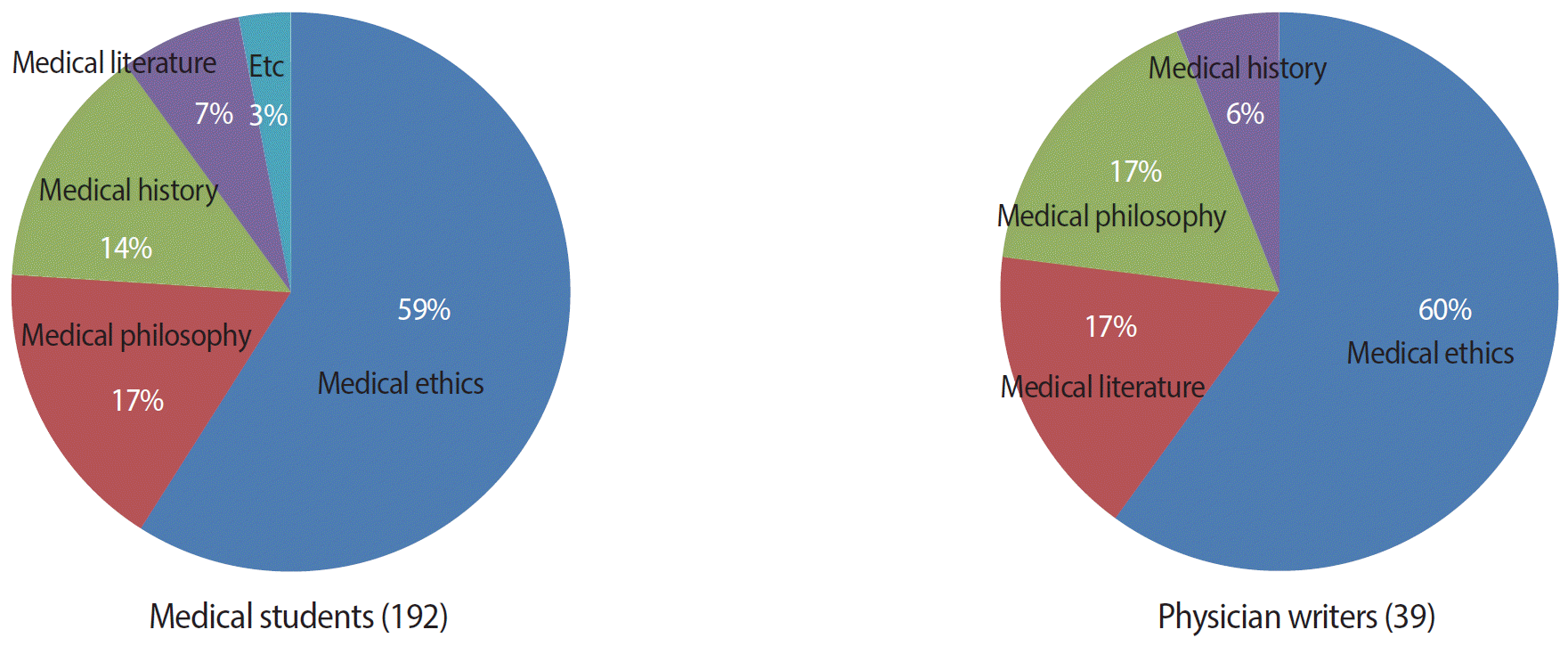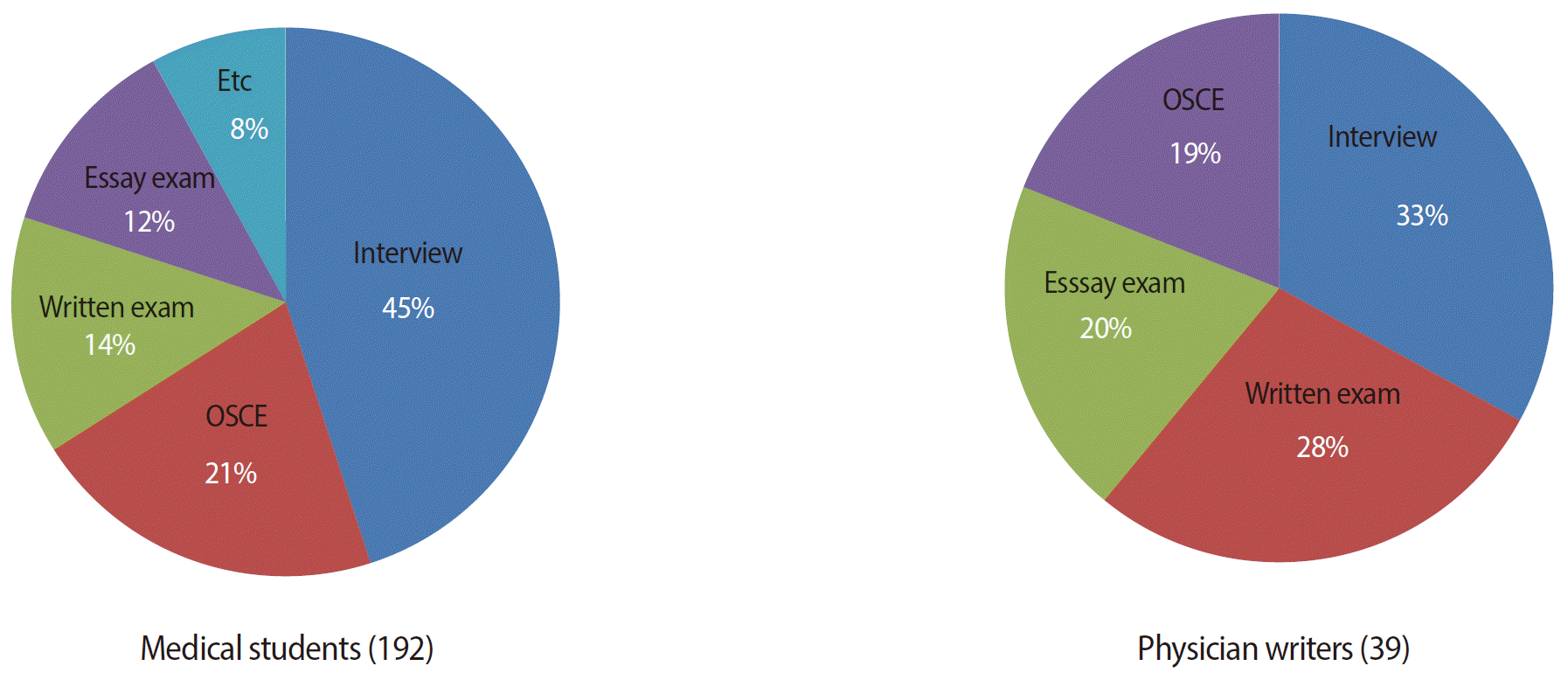Articles
- Page Path
- HOME > J Educ Eval Health Prof > Volume 11; 2014 > Article
-
Brief Report
Is a medical humanities test needed in the National Medical Licensing Examination of Korea? Opinions of medical students and physician writers (secondary publication) -
Kun Hwang*

-
DOI: https://doi.org/10.3352/jeehp.2014.11.16
Published online: August 12, 2014
Department of Plastic Surgery, Inha University School of Medicine, Incheon, Korea
- *Corresponding email: jokerhg@inha.ac.kr
© 2014, National Health Personnel Licensing Examination Board of the Republic of Korea
This is an open-access article distributed under the terms of the Creative Commons Attribution License, which permits unrestricted use, distribution, and reproduction in any medium, provided the original work is properly cited.
Abstract
- The purpose of this study was to examine the opinions of medical students and physician writers regarding the medical humanities as a subject and its inclusion in the medical school curriculum. Furthermore, we addressed whether an assessment test should be added to the National Medical Licensing Examination of Korea (KMLE). A total of 192 medical students at Inha University and 39 physician writers registered with the Korean Association of Physician Essayists and the Korean Association of Physician Poets participated in this study. They were asked to answer a series of questionnaires. Most medical students (59%) and all physician writers (100%) answered that the medical humanities should be included in the medical school curriculum to train good physicians. They thought that the KMLE did not currently include an assessment of the medical humanities (medical students 69%, physician writers 69%). Most physician writers (87%; Likert scale, 4.38±0.78) felt that an assessment of the medical humanities should be included in the KMLE. Half of the medical students (51%; Likert scale, 2.51±1.17) were against including it in the KMLE, which they would have to pass after several years of study. For the preferred field of assessment, medical ethics was the most commonly endorsed subject (medical students 59%, physician writers 39%). The most frequently preferred evaluation method was via an interview (medical students 45%, physician writers 33%). In terms of the assessment of the medical humanities and the addition of this subject to the KMLE, an interview-based evaluation should be developed.
Acknowledgments
SUPPLEMENTARY MATERIAL
Fig 1.Preferred field of assessment in the medical humanities reported by medical students and medical writers in Korea in 2014.


Fig 2.Preferred method of assessment of the medical humanities reported by medical students and medical writers in Korea in 2014. OSCE, objective structured clinical examination.


Table 1.Comparison of the responses of students and physician writers to a questionnaire regarding cases relevant to the medical humanities, on a five-point (1.5) Likert scale, in Korea in 2014
Table 2.Comparison of medical students’ responses to a questionnaire regarding cases relevant to the medical humanities, by year of study, on a five-point (1.5) Likert scale, in Korea in 2014
- 1. Jung MH, Sim JS, Jung EK, Lee SH. A survey on the perception of the feasibility of adding questions related to medical humanities and sociology on the written test of the National Medical Licensing. Seoul (KR): Korean Institute of Medical Education and Evaluation; 2008.
- 2. Lee JH. An illegal use intravenous propofol [Internet]. Seoul (KR): Doctor’s News; 2013 [cited 2013 Jul 30]. Available from: http://www.doctorsnews.co.kr/news/articleView.html?idxno=89874
- 3. Jung SW. Doctor’s behavior associated with illegal acts for reducing the penalty of the rich offender [Internet]. Seoul (KR): Cheongnyeonuisa; 2014 [cited 2014 May 16]. Available from: http://www.docdocdoc.co.kr/news/newsview.php?newscd=2014051500057
- 4. Lee JH. A large-scale rebate associated with a well-known pharmaceutical company [Internet]. Seoul (KR): Doctor’s News; 2013 Available from: http://www.doctorsnews.co.kr/news/articleView.html?idxno=90386
References
Figure & Data
References
Citations
Citations to this article as recorded by 

- Medical students’ self-evaluation of character, and method of character education
Yera Hur, Sanghee Yeo, Keumho Lee
BMC Medical Education.2022;[Epub] CrossRef - Definition of character for medical education based on expert opinions in Korea
Yera Hur
Journal of Educational Evaluation for Health Professions.2021; 18: 26. CrossRef - Medical humanities in medical education and practice
Hedy S. Wald, Jonathan McFarland, Irina Markovina
Medical Teacher.2019; 41(5): 492. CrossRef - Medical humanities: developing into a mainstream discipline
P. Ravi Shankar
Journal of Educational Evaluation for Health Professions.2014; 11: 32. CrossRef

 KHPLEI
KHPLEI

 PubReader
PubReader ePub Link
ePub Link Cite
Cite



